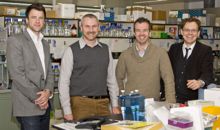2010 Press Releases
14.12.2010
Two collaborative research teams at UCC have received Healthcare Innovation Programme Awards (HIPA) from Science Foundation Ireland (SFI). Dr Justin McCarthy (Department of Biochemistry) in conjunction with Dr Gerard McGlacken (Department of Chemistry) of the Analytical & Biological Chemistry Research Facility (ABCRF) have secured a research award that will fund a postgraduate student to contribute to Dr McCarthy’s current SFI Principal Investigator research programme focused on determining the involvement of regulated intramembrane proteolysis in the immune system.
Specifically, the research concerns methods for assessing γ-secretase inhibitors as modulators of IL-1β and TNFa cytokine responses and their potential future use as therapeutics in inflammatory disorders.
Dr David Clarke (Department of Microbiology) and Dr Ruaidhri Carmody (Department of Biochemistry) have received funding to examine the role of Escherichia coli in the development of inflammation associated with Crohns’ Disease, a chronic inflammatory bowel disorder. In particular this research, which will be carried out by a postgraduate student, is aimed at understanding the role of the E. coli in the induction of the pro-inflammatory cytokine, TNFa, with the aim of identifying potential targets for the development of novel Crohns’ Disease therapies. Current research in Dr Clarke’s and Dr Carmody’s laboratories is funded through the Alimentary Pharmabiotic Centre (APC), a government-funded multidisciplinary research centre focusing on intestinal health based in UCC, the Health Research Board and SFI.
SFI with the support of the Johnson & Johnson Corporate Office of Science and Technology (COSAT) in cooperation with Advanced Technologies and Regenerative Medicine LLC, (ATRM), are undertaking a joint initiative to strengthen particular areas of healthcare research. Under this 2010 joint initiative, the focus is on funding preliminary proof of concept proposals in the area of Immune-modulated Inflammation Research . It is envisaged that participation in this initiative will allow SFI Researchers and COSAT-ATRM to identify technology needs and influence future industry standards.
This Programme will help accelerate the translation of UCC researcher’s basic research into therapies useful in the treatment of inflammatory diseases.
Picture: Award recipients L-R, Dr Gerard McGlacken (Department of Chemistry), Dr Justin McCarthy (Department of Biochemistry), Dr David Clarke (Department of Microbiology) and Dr Ruaidhri Carmody (Department of Biochemistry), UCC

